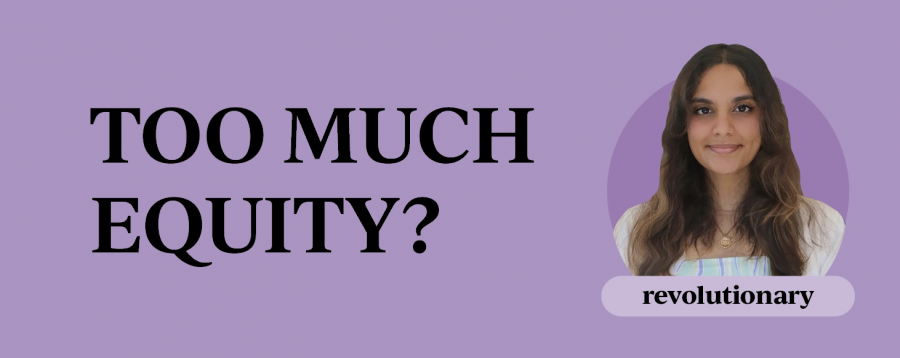I love going to school in Carmel. This school has dozens of opportunities to celebrate students’ unique individuality, from extracurriculars that enhance identities to clubs that encourage activism. Our student body is diverse, and many peers make an effort to welcome students of all backgrounds.
And while I think there are several areas of improvement at CHS—from hiring more diverse staff to teaching more representative curriculums—I can recognize that we’ve significantly progressed with the social and political environment around us.
However, over the past few months, Carmel Clay Schools have experienced an abundance of criticism for allowing too much equity and inclusion in schools, specifically in terms of books and curriculum. Some parents claim that the schools have overstepped by teaching students about race and LGBTQ+ issues, resulting in “indoctrination”.
In fact, back in July, our CCS school board meeting made breaking news when parents read sexually explicit excerpts from books in schools to protest their availability. Just last week, one group posted that the book “Call Me Max,” a book about a young transgender elementary student, should not be available in schools because it “expressed values that did not line up with the city of Carmel.”
As a result, many schools pulled books about LGBTQ+ issues, race issues, and slavery off their shelves and removed them from curriculums. Actions like these are harmful—not only because they attempt to erase the diversity we’ve built at Carmel—but because they also neglect to take into account the opinions of an important group: the students.
I’ve been a student at Carmel for as long as I can remember, and I have never felt that schools or teachers were indoctrinating or overstepping their boundaries. In fact, discussions about race and gender issues in classrooms, while rare, have only built my empathy and understanding for others around me. And after seeing hundreds of students comment on posts, show up to school board meetings, and host events to promote diversity, I know they feel the same.
That’s why I think it’s critical for schools and parents to listen to students first. All things considered, students are the ones who are actually learning in schools and being exposed to new issues and ideas; it’s only fair that they have a prominent voice in this conversation.
Truthfully, I recognize how it can be difficult for concerned adults and parents to adapt. The social and political environment today looks drastically different from what it was 50 years ago. But rather than jumping to conclusions and inadvertently erasing identities, parents should take time to understand students and cooperate with schools. And only by listening to student voices can we empower our schools to be more inclusive and equitable.
The views in this column do not necessarily reflect the views of the HiLite staff. Reach Sowmya Chundi at [email protected]
To view more of Sowmya Chundi’s work, click here.




























![Keep the New Gloves: Fighter Safety Is Non-Negotiable [opinion]](https://hilite.org/wp-content/uploads/2024/12/ufcglovescolumncover-1200x471.png)
















































![Review: “We Live in Time” leaves you wanting more [MUSE]](https://hilite.org/wp-content/uploads/2024/12/IMG_6358.jpg)
![Review: The premise of "Culinary Class Wars" is refreshingly unique and deserving of more attention [MUSE]](https://hilite.org/wp-content/uploads/2024/12/MUSE-class-wars-cover-2.png)
![Introducing: "The Muses Who Stole Christmas," a collection of reviews for you to follow through winter [MUSE]](https://hilite.org/wp-content/uploads/2024/12/winter-muse-4.gif)
![Review: "Meet Me Next Christmas" is a cheesy and predictable watch, but it was worth every minute [MUSE]](https://hilite.org/wp-content/uploads/2024/11/AAAAQVfRG2gwEuLhXTGm3856HuX2MTNs31Ok7fGgIVCoZbyeugVs1F4DZs-DgP0XadTDrnXHlbQo4DerjRXand9H1JKPM06cENmLl2RsINud2DMqIHzpXFS2n4zOkL3dr5m5i0nIVb3Cu3ataT_W2zGeDAJNd_E-1200x884.jpg)
![Review: "Gilmore Girls", the perfect fall show [MUSE]](https://hilite.org/wp-content/uploads/2024/11/gilmore-girls.png)
![Review in Print: Maripaz Villar brings a delightfully unique style to the world of WEBTOON [MUSE]](https://hilite.org/wp-content/uploads/2023/12/maripazcover-1200x960.jpg)
![Review: “The Sword of Kaigen” is a masterpiece [MUSE]](https://hilite.org/wp-content/uploads/2023/11/Screenshot-2023-11-26-201051.png)
![Review: Gateron Oil Kings, great linear switches, okay price [MUSE]](https://hilite.org/wp-content/uploads/2023/11/Screenshot-2023-11-26-200553.png)
![Review: “A Haunting in Venice” is a significant improvement from other Agatha Christie adaptations [MUSE]](https://hilite.org/wp-content/uploads/2023/11/e7ee2938a6d422669771bce6d8088521.jpg)
![Review: A Thanksgiving story from elementary school, still just as interesting [MUSE]](https://hilite.org/wp-content/uploads/2023/11/Screenshot-2023-11-26-195514-987x1200.png)
![Review: "When I Fly Towards You", cute, uplifting youth drama [MUSE]](https://hilite.org/wp-content/uploads/2023/09/When-I-Fly-Towards-You-Chinese-drama.png)
![Postcards from Muse: Hawaii Travel Diary [MUSE]](https://hilite.org/wp-content/uploads/2023/09/My-project-1-1200x1200.jpg)
![Review: "Ladybug & Cat Noir: The Movie," departure from original show [MUSE]](https://hilite.org/wp-content/uploads/2023/09/Ladybug__Cat_Noir_-_The_Movie_poster.jpg)
![Review in Print: "Hidden Love" is the cute, uplifting drama everyone needs [MUSE]](https://hilite.org/wp-content/uploads/2023/09/hiddenlovecover-e1693597208225-1030x1200.png)
![Review in Print: "Heartstopper" is the heartwarming queer romance we all need [MUSE]](https://hilite.org/wp-content/uploads/2023/08/museheartstoppercover-1200x654.png)




